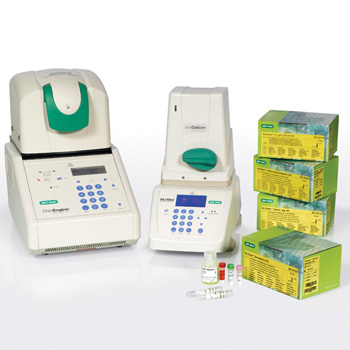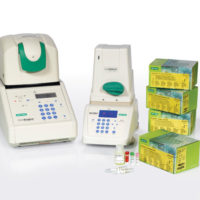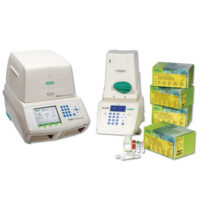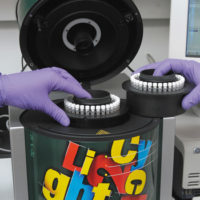Real-Time PCR Test Speeds Time to Results

Salmonella causes one of the most common intestinal infections in the United States—salmonellosis. Overall, it is the second most common bacterial foodborne illness reported (usually slightly less frequent than Campylobacter infection) in the U.S. The incidence of Salmonella infections has remained between 14 and 16 cases per 100,000 persons since the first years of surveillance, according to the Centers for Disease Control and Prevention, which estimates that 1.4 million cases occur each year.
Aemtek Inc. is a microbiology laboratory that provides analytical services to the food, pharmaceutical and environmental industries. Its goal is to help food manufacturers, processors, packagers and importers ensure food safety and safeguard their brands. The company’s services include pathogen detection, indicator organism quantification, environmental sampling plans, Good Manufacturing Practices, Hazard Analysis and Critical Control Points (HACCP), Sanitation Standard Operating Procedures and audits, U.S. Food and Drug Administration (FDA) compliance, risk management and product recall management.
Searching for a Faster Method
As Aemtek performs hold-and-release pathogen testing, turnaround time is an important factor for the clients that they serve. For products with short shelf lives or for products in urgent demand, a reduction in holding time was greatly needed. Some of Aemtek’s clients wanted the company to switch from the use of culture-based methods to PCR-based methods, since culture-based methods often take three days or more from beginning to end.
Previously, the company was using FDA Bacteriological Analytical Manual (BAM) testing. This process takes 72–96 hours (3–4 days), depending on the food sample being analyzed, and must be followed by biochemical/serological confirmation of Salmonella contamination, increasing the time to results to as long as five days. The need to simplify and speed the process led Aemtek to research PCR-based methods that would allow for faster results and reporting with comparable sensitivity and specificity. From the laboratory’s point of view, a method that requires fewer hands-on procedures without sacrificing accuracy and precision was preferred, because fewer steps mean fewer chances to make mistakes.
Florence Wu, Ph.D., president of Aemtek, was asked what drew the company to seek out Bio-Rad’s product. “Bio-Rad has a reputation of being innovative and user-friendly,” she said. “We had been using Bio-Rad’s instruments and reagents, so when Bio-Rad’s representative approached us with their product, we were open to their ideas. When our clients demanded large-volume Salmonella testing, we evaluated Bio-Rad’s iQ-Check Salmonella II Kit and decided to use it, partly due to the technical advantages of this product and partly due to the fact that Bio-Rad offered us an instrument rental solution.”
The iQ-Check PCR kit has several advantages: 1) it has documented sensitivity and specificity as validated by AOAC performance testing because it uses gene-specific probes and primers; 2) it does not require proprietary media enrichment (instead, buffered peptone water is used for sample enrichment); 3) there are no special sample preparation or pre-enrichment requirements, so the process is fast; 4) the required sample incubation time is easy to insert into a typical laboratory work flow; 5) DNA extraction and PCR preparation steps are few and simple, reagents are ready to use and internal control is included; 6) the PCR setup system is scientifically sound and the PCR software interface is user-friendly; and 7) the PCR instrument is small and does not require much benchtop space. In addition, Bio-Rad’s representatives are known to be helpful, resourceful and professional, and to provide proper training of the system.
This real-time PCR kit also allows rapid control and reaction times in HACCP procedures. With this high-throughput methodology, 94 samples can be processed simultaneously, and the test can be performed in parallel with other iQ-Check tests on the 96-well real-time instrument (tests are available for E. coli O157:H7, Listeria spp., Listeria monocytogenes and Campylobacter). Bio-Rad also offers a smaller 48-well real-time instrument for laboratories with lower throughput.
Aemtek tests all significant food pathogens and indicator organisms to provide superior service to its clients. “The highest demand for testing is Salmonella. We were deeply involved in recent product recall testing and consulting and tested several hundred product and environmental samples for Salmonella. Bio-Rad’s iQ-Check Salmonella II Kit enabled us to provide our client with accurate, fast and reliable data that helped both the regulatory agencies and our client in the decision-making process,” Wu noted. “In other cases, we have helped clients in their daily/in-process testing using this kit to meet their quality control demands.”
For Aemtek, Bio-Rad’s iQ-Check Salmonella II Kit is an alternative to the BAM method because of its sensitivity and specificity. Its simplicity and user-friendly features allow the proper training of laboratory technicians and the production of laboratory results more efficiently. This rapid method benefits Aemtek’s clients through reliable analytical services and enables the company to grow in the laboratory testing business.
www.foodscience.bio-rad.com
Looking for a reprint of this article?
From high-res PDFs to custom plaques, order your copy today!





